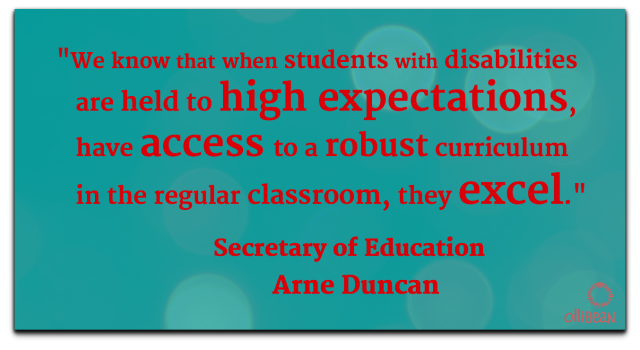“We know that when students with disabilities are held to high expectations, have access to a robust curriculum in the regular classroom, they excel.” Secretary of Education , Arne Duncan
Until recently, the Department of Education’s primary focus was evaluating states compliance meeting procedural requirements- timelines for evaluations, due process hearings and transition services. Under the new framework, Results-Driven Accountability (RDA), the Department will also include educational results and outcomes for students with disabilities in making each state’s annual determination under the Individuals with Disabilities Education Act (IDEA).
“Every child, regardless of income, race, background, or disability can succeed if provided the opportunity to learn,” U.S. Secretary of Education Arne Duncan said. “We know that when students with disabilities are held to high expectations and have access to the general curriculum in the regular classroom, they excel. We must be honest about student performance, so that we can give all students the supports and services they need to succeed.”
OSERS will fund a new $50 million technical assistance center – the Center on Systemic Improvement – to help states leverage the $11.5 billion in federal special education funds which they currently receive to improve outcomes for students with disabilities. Additionly, OSERS will be working with each state to support them in developing comprehensive plans designed to improve results for children with disabilities.
“Less than 10 percent of our nation’s eighth graders with IEPs are scoring proficient in reading, according to the best available data. We can and must do better,” said Michael Yudin, acting assistant secretary for special education and rehabilitative services. “RDA is about using the accountability framework to provide states with incentives and support to implement evidence-based strategies to improve results and outcomes for students with disabilities.”
IDEA requires the primary focus of federal and state monitoring to be on improving educational results and functional outcomes for all children with disabilities and ensuring that each state meets the program requirements under IDEA. In particular, the law places an emphasis on those requirements that are the most closely related to improving educational and early intervention results for children with disabilities.








I certainly hope that Minnesota will take the challenge- and have high expectations for all of our students with or without disabilities.
High expectations -ABSOLUTELY!! Inclusion – DEFINITELY!! But one of the main factors that non-educator politicians are still refusing to address is poverty. It is very difficult/impossible to teach a child when they are hungry(It would be interesting to know how many kids with IEPs are also on the low income spectrum). When will breakfast and lunch be free for ALL students so that kids can focus on school and not where their next meal is coming from. And I say ALL students because kids learn at an early age that the embarrassment of “free or reduced” meals isn’t worth eating. I learned this during my 27 years of educating kids! Also, be aware that if you have a child with an IEP and Arne Duncan is pushing for special education reform similar to the mess that he has made with general education and all the testing, your child is subject to take the tests that come with this reform and it will be used to evaluate teachers. And that means that billions will go to the pockets of the million dollar companies who make the tests. This article makes it sound like all kinds of money will be going into your child’s education. In all actuality the majority of it is going towards testing. I will be opting my daughter out of this test driven agenda. You may want to do the same!!
I fought with the schools quite a bit because they were only interested in dealing with the “problems” that my son had. When he started school he was really advanced but it got to where in some of his subjects that he was dropping backwards to be “average” because he was not challenged to do more, to learn more. So sad! But I had had enough and switched to an online school that has been more academically challenging and got him involved with a very active homeschool group. Now thankfully, my 14 year old son is now able to take classes at the local college on things that he is truly interested in! And the social interactions that he is experiencing is more valuable and appropriate than what he would have received in the “autism unit” in our local brick and mortar school. :)
IDEA is short sighted….it doesn’t allow for enrichment or gifted programs for students with disabilities and if a student with a disability has a talent that’s used as an excuse to deny services. IDEA can do better!